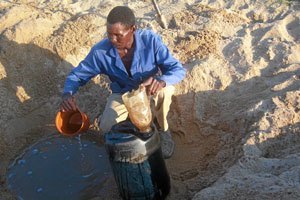
RECURRING droughts, sometimes followed by floods, are taking a toll on the lives of many women and children in Matabeleland South province, who are now struggling to survive, Standardcommunity has learnt.
BY MOSES MUGUGUNYEKI
The uneven distribution of water resources — the result of erratic rainfall and varying climate — has divided the country into areas of plenty water resources and areas of extreme water scarcity and stress.
Provinces such as Mashonaland, Manicaland and parts of Midlands have abundant water resources, while Matabeleland region and the south western parts of Masvingo province suffer chronic shortages because they experience erratic rainfall.
A recent survey carried out by Standardcommunity showed that many women in Matabeleland South bear the brunt of the water crisis. These perennial water problems affect women directly, as it burdens them with an additional task of fetching water from distant places.
In Sengezane, Ward 14 in Gwanda Central most families rely on water drawn from river beds. These sources which are called, isizibeni in community lingo have over the years been a panacea to this community’s water woes.
“Sengezane and Guyu are among parts of Matabeleland South that suffer persistent water shortages. We always rely on the shallow wells that we dig along the river beds, especially this time of the year when water diminishes from our local dam as a result of evaporation,” said a local villager, Gilbert Ncube.
Ncube added that in most cases women and children carry the responsibility of digging these wells and fetching water.
- Chamisa under fire over US$120K donation
- Mavhunga puts DeMbare into Chibuku quarterfinals
- Pension funds bet on Cabora Bassa oilfields
- Councils defy govt fire tender directive
Keep Reading
A recent UN survey of 177 countries pointed out that women spend about an estimated 40 billion hours a year collecting water, incapacitating their efforts to engage in other productive activities.
Community dams panacea to perennial water problems: MP
Gwanda Central National Assembly member, Edson Gumbo said the provision of safe water was proving to be an Achilles’ heel but said the solution to all these woes was to build community dams.
“Provision of safe water is a great challenge in Matabeleland South, considering that the area is arid. However, I have been working with communities for the past few years to build some community dams in Gwanda Central,” said Gumbo.
He mobilised funds to rehabilitate the Ntepe dam wall in 2011, benefitting the entire community, including Garanyemba.
However, Gumbo believes that the long-term solution to the water problems facing the constituency lies in the construction of the Thuli-Manyanke dam in Ward 15.
“I moved a motion in parliament for the construction of the Thuli-Manyanke dam whose idea was mooted in 1912. This is the only way we can mitigate the current water problems in Gwanda,” he said.
Gumbo said the water problem was affecting women and children mostly.
“Women and children in most cases fetch water and this is affecting children’s learning,” said Gumbo.
Access to safe and clean drinking water is a basic human right and is essential for achieving gender equality, sustainable development and poverty alleviation. According to the Water Supply and Sanitation Collaborative Council, the world’s health sectors would save around US$12 billion a year if everyone has access to adequate and clean water services.
Unicef Zimbabwe, chief communications officer, Victor Chinyama said the organisation was working on projects to improve access to safe water in Matabeleland South.
He said Unicef, with support from the UK government through the Department for International Development (DFID), was supporting a four year (2012-2016) Rural Wash Project that is covering all the seven districts of Matabeleland South province.
The Wash project is aimed at improving access to safe water supply among rural communities through the drilling of approximately 350 new boreholes, rehabilitation of seven piped water schemes and repair of 1 700 broken down boreholes.
“The project will also support improving sanitation and hygiene status in the targeted communities and strengthening government capacity for sustainable management of Wash services,” said Chinyama.
“To date, a total of 100 boreholes have been successfully drilled and fitted with hand pumps and are currently supplying safe water to approximately 23 000 people in the districts of Bulilima, Mangwe and Beitbridge in Matabeleland South province. Assessment of broken down boreholes and piped water schemes is in progress.”
Chinyama said women and girls bear the brunt and drudgery of water collection, having to spend long hours travelling long distances to fetch water for domestic use.
“For the women, this means they lose opportunities to do other chores as well as income generating activities. ”











